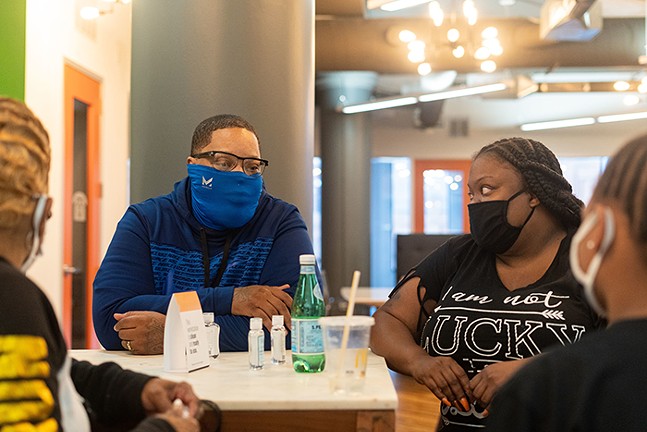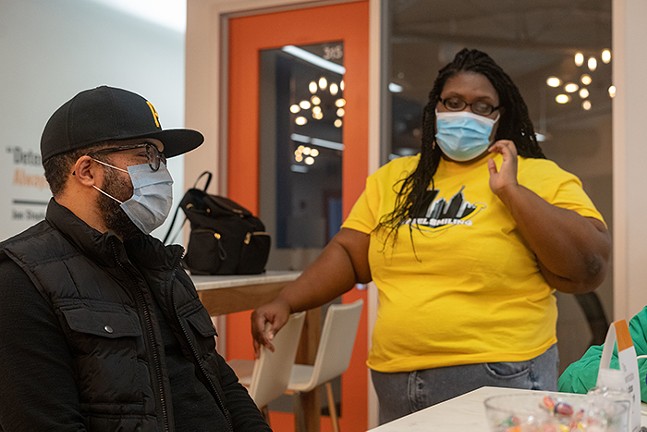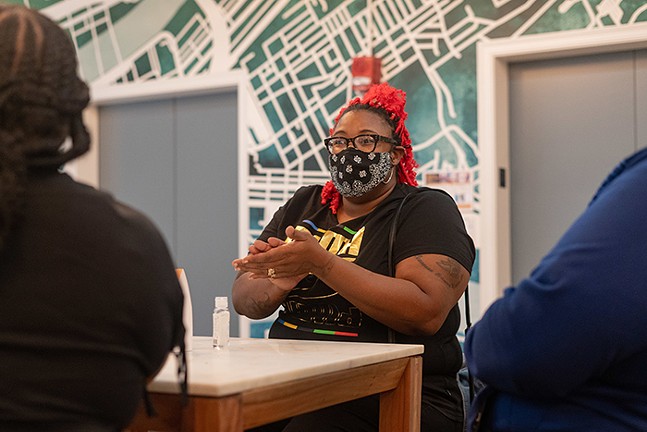
Experts predicted that the pandemic would exacerbate mental health problems and eventually lead to more suicides. School closures, stay-at-home orders, loss of employment, and loss of income all contributed to the erosion of social networks. According to the CDC, these factors are contributing to more suicides nationally.
With COVID cases rising again, and an election that won’t seem to end, those stressors seem to be continuing at pace. But there are steps that everyone can take to combat this crisis. It is not hopeless.
Pittsburgh City Paper spoke to local organizations that provide suicide-prevention resources and support, and they both offered advice on how to detect if someone is experiencing suicidal thoughts, how to help address and work through those thoughts, and how to maintain support for people so they can continue their positive mental health.
How to spot warning signs
Jesse Putkoski is the Western Pennsylvania director for the American Foundation for Suicide Prevention, a nationwide nonprofit that raises funds for scientific research and provides support for those who have lost loved ones to suicide. Putkoski says AFSP suggests looking for three different factors in people who might be considering suicide: talk, behavior, and mood. Someone talking about wanting to commit suicide is the most obvious sign, but Putkoski says that talking about being a burden on people around them can also be a sign that they are struggling.
Some behaviors that people should monitor are issues with sleep, sudden withdrawal from activities, and the overuse of alcohol and drugs, says Putkoski. This can also mean asking about noticeable differences in people’s social media use. People setting up ways or methods in which to harm themselves is also something to look out for. And overall, Putkoski advises people to generally monitor people’s behavior and moods to see if they are consistently acting out of the ordinary.
“Paying attention to differences in people’s mood is important,” says Putkoski. “Anything dissimilar from their normal behavior. Even unexplained happiness, it can indicate they are going to act on a plan.”
Some might think this comes across as paranoid, but it’s not as if noticing how people are acting differently is the same as policing a loved one’s behavior. And opening up a dialogue about these warning signs doesn’t have negative consequences, as some people might assume.
“Talk to them, show them that you care,” says Putkoski. “You can ask them directly [about suicide]. Studies show that asking people who aren't thinking about it is not going to put the idea into their heads.”
Julius Boatwright, founder and chief executive officer of local mental health organization Steel Smiling, says crises can look different for different people. And that understanding the disparate ways people are in pain can help identify the ways loved ones can help.
“We might think a crisis is always yelling and screaming, and is visible,” says Boatwright. “But I like to think of the crisis spectrum.”
What to do when loved ones are contemplating suicide
Steel Smiling focuses on education, advocacy, and awareness of mental health, particularly within Pittsburgh’s Black community. Boatwright says acknowledging people’s suicidal thoughts is paramount in directing them to the help they need. “The first thing that I always keep in mind, if and when someone says they are thinking about suicide, is that we, the collective we, have to acknowledge that as being valid,” says Boatwright.
Boatwright has dealt with his own suicidal thoughts. He says he still calls suicide hotlines maybe a few times a year, and recommends that for those in need. He says that receiving an authentication acknowledgement of those thoughts goes a long way.
“For the times I have had my own suicidal thoughts, just that simple acknowledgement is big,” says Boatwright. “Someone sees me and hears me in this time of turmoil.”
He says that sometimes acknowledgement from a family member or friend is enough to help start people on a path to better mental health, but also reminds people that there are some instances where deep issues and chemical imbalances are too severe and there might only be licensed and trained professionals who can help.
Putkoski agrees that talking directly to people having suicidal thoughts is important, as is listening to them and not trying right away to fix their concerns. Just listen.
“Avoid minimizing their feelings. Avoid advice to fix it,” sas Putkoski. “They need to be heard, and they need to be listened to.”
But acknowledgement and listening is just a first step. Boatwright says that putting together a crisis plan with the person struggling with mental health issues can be a powerful tool to use any time that person has suicidal thoughts again.
These crisis plans should provide several different avenues for people to turn to when individuals are suffering from suicidal thoughts or loved ones notice that others might be contemplating suicide. Plans should be written down and shared with several people, but Boatwright says that those struggling with mental health should be in control of the crisis plan process. He says that might mean that individuals share parts of the plan with family, and other parts of the plan with friends.
Plans can provide suggestions of who people can seek out when they are struggling. It might mean a therapist one time, or a crisis call line another time, or just a chat with a family member. Boatwright is very bullish on crisis plans and hopes they become a national movement to prevent suicides. (People can call the National Suicide Prevention Lifeline at 1-800-273-8255 “TALK” or text 741-741.)
“Crisis plans for everyone. This should be a thing that sweeps the country, where everyone makes a plan,” says Boatwright.
Other actions people should take when loved ones share suicidal thoughts include taking measures to remove or secure dangerous items, like firearms, knives, and drugs. Boatwright says suicide is often impulsive and so making it more difficult to access dangerous items can help prevent people harming themselves.
Boatwright also says just being around people can be powerful in preventing suicides.“Avoid minimizing their feelings. Avoid advice to fix it. They need to be heard, and they need to be listened to.”
tweet this
“Having someone there decreases the probability of dying by suicide,” he says. “People have to be engaging in a way that is supportive.”
Being supportive can mean being a good listener, but also being aware of how your body language affects the conversation. Posture, hand movements, etc. are things that can determine how accepting you come across. And Boatwright says initially avoiding the “jump to fix it” mode is crucial in letting people really express themselves.
“Humanize that person in that moment,” he says. “For me, personally, it has allowed me to be in my body, and maybe it allows in a little bit of hope.”
How to maintain positive mental health moving forward
Once mental health issues and suicidal thoughts are temporarily assuaged, crisis plans, therapy, or whatever helped people get through the issues shouldn’t be abandoned. Putkoski says there are a plethora of resources available — like at AFSP’s website afsp.org — and that helping to break the stigma of mental health is important. She says it’s important to let people know about available resources, remind them there is nothing wrong with seeking them out, and make sure you keep in touch with them. “Continue to check in on them,” says Putkoski. “If you know they had a therapist appointment, ask them about it. Just make sure you are staying connected with them.”
Boatwright agrees and says this extends to those who have lost loved ones to suicides.
“Know that people will be mourning for the rest of their lives, and so being intentional to maintain relationships, particularly to those who have lost loved ones and friends to suicide, is very important,” says Boatwright.
He also says ending the stigma is important, and has noticed that Pittsburgh’s Black community is showing encouraging signs of just that. Steel Smiling has been growing over the last five years, and many clients are expressing excitement about seeking out mental health support. This is despite what Boatwright says is a historial aversion to mental health support in the Black community.
“For a long time, we as a society, thought Black people have a stigma towards mental health, that Black people want to pray it away, but that is false,” says Boatwright. “I don’t know how that narrative got spread. They are confronting these challenges and wanting to heal.”
This gives Boatwright hope for the future, and a hope to address big underlying causes of suicide that have disproportionately affected Black Americans: institutional racism and income inequality. Boatwright says Pittsburghers and Americans need to ask how to address these structural problems.
“What are we doing collectively? Where were we when that person was facing eviction, or even simple things like a break-up?” says Boatwright. “And that is what is happening in the pandemic, people are having all these issues all at once. We need to have this discussion. Instead of just self-care, it is called collective care. How are we tending to the mental and social needs of our neighbors?”
Steel Smiling
steelsmilingpgh.org
American Foundation for Suicide Foundation, Western Pennsylvania Chapter
afsp.org/chapter/western-pennsylvania
National Suicide Prevention Lifeline
1-800-273-8255















